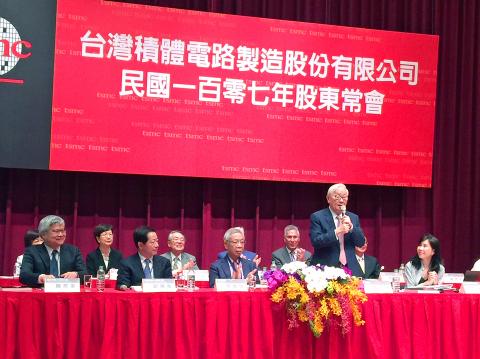Taiwan Semiconductor Manufacturing Co (TSMC, 台積電) chairman Morris Chang (張忠謀) yesterday reassured company shareholders that the company would continue its “miraculous” growth as he handed over to his successors.
Making his final appearance as chairman at an annual shareholders’ meeting, Chang, 87, said he has strong confidence that the new board of directors and management team would be a very capable combination and continue to grow the company.
Chang announced his succession and retirement plans in October last year, proposing a dual-leadership structure.

Photo: Hung Yu-fang, Taipei Times
He nominated joint chief executive Mark Liu (劉德音) to take his position as chairman and joint chief executive C.C. Wei (魏哲家) to become the sole chief executive.
Liu and Wei had been working as joint chief executives since 2013.
The board of directors yesterday approved the plan.
“I am pleased that the company has experienced almost miraculous growth over the past 31 years in terms of revenue, profit and its importance worldwide,” Chang said in his opening speech to shareholders at the company’s headquarters in Hsinchu. “I strongly believe that they [the new board and management team] will complete the succession plan smoothly and successfully. TSMC, definitely, will continue to create endless miracles. There is no end to that yet.”
Starting from almost scratch, TSMC has grown into the world’s largest chip foundry with a 56 percent share of the global market.
The chipmaker’s market value swelled to NT$5.938 trillion (US$199.16 billion) as of yesterday, making it the most valuable company among local listed firms.
The company’s market capitalization was less than US$220 million when it started in 1987, Chang said in October.
By last year, revenue rose 3.1 percent year-on-year to a record high of NT$977.45 billion.
Net profit also rose 3 percent to an all-time high of NT$343.11 billion, or earnings per share of NT$12.89.
TSMC set a goal to increase its annual revenue by between 5 and 10 percent in the next five years.
TSMC manufactured 9,920 products last year for 465 clients, including big names such as Apple Inc and Qualcomm Inc.
Answering a shareholder’s question about how to overcome challenges, Chang said competition would always be TSMC’s biggest challenge, like in any other company.
TSMC has one or two strong competitors in the area of advanced technology and a dozen more in legacy technologies, he said.
It has allocated tremendous human and economic resources to overcome those challenges, he said.
Global trade tensions are another challenge, Chang said.
“We are as a very important link in the semiconductor supply chain,” Chang said. “If the US and China get into a serious trade dispute ... and a trade war starts that involves the electronics supply chain, we will be affected in some way.”
TSMC has very large customer bases in the US and China, he said.
Commenting on the threat from the firm’s Chinese rivals, Chang reiterated his forecast that TSMC’s Chinese peers would lag behind by between five and seven years over next five to 10 years.

DEFENDING DEMOCRACY: Taiwan shares the same values as those that fought in WWII, and nations must unite to halt the expansion of a new authoritarian bloc, Lai said The government yesterday held a commemoration ceremony for Victory in Europe (V-E) Day, joining the rest of the world for the first time to mark the anniversary of the end of World War II in Europe. Taiwan honoring V-E Day signifies “our growing connections with the international community,” President William Lai (賴清德) said at a reception in Taipei on the 80th anniversary of V-E Day. One of the major lessons of World War II is that “authoritarianism and aggression lead only to slaughter, tragedy and greater inequality,” Lai said. Even more importantly, the war also taught people that “those who cherish peace cannot

STEADFAST FRIEND: The bills encourage increased Taiwan-US engagement and address China’s distortion of UN Resolution 2758 to isolate Taiwan internationally The Presidential Office yesterday thanked the US House of Representatives for unanimously passing two Taiwan-related bills highlighting its solid support for Taiwan’s democracy and global participation, and for deepening bilateral relations. One of the bills, the Taiwan Assurance Implementation Act, requires the US Department of State to periodically review its guidelines for engagement with Taiwan, and report to the US Congress on the guidelines and plans to lift self-imposed limitations on US-Taiwan engagement. The other bill is the Taiwan International Solidarity Act, which clarifies that UN Resolution 2758 does not address the issue of the representation of Taiwan or its people in

Taiwanese Olympic badminton men’s doubles gold medalist Wang Chi-lin (王齊麟) and his new partner, Chiu Hsiang-chieh (邱相榤), clinched the men’s doubles title at the Yonex Taipei Open yesterday, becoming the second Taiwanese team to win a title in the tournament. Ranked 19th in the world, the Taiwanese duo defeated Kang Min-hyuk and Ki Dong-ju of South Korea 21-18, 21-15 in a pulsating 43-minute final to clinch their first doubles title after teaming up last year. Wang, the men’s doubles gold medalist at the 2020 and 2024 Olympics, partnered with Chiu in August last year after the retirement of his teammate Lee Yang

The Philippines yesterday criticized a “high-risk” maneuver by a Chinese vessel near the disputed Scarborough Shoal (Huangyan Island, 黃岩島) in a rare incident involving warships from the two navies. The Scarborough Shoal — a triangular chain of reefs and rocks in the contested South China Sea — has been a flash point between the countries since China seized it from the Philippines in 2012. Taiwan also claims the shoal. Monday’s encounter took place approximately 11.8 nautical miles (22km) southeast” of the Scarborough Shoal, the Philippine military said, during ongoing US-Philippine military exercises that Beijing has criticized as destabilizing. “The Chinese frigate BN 554 was